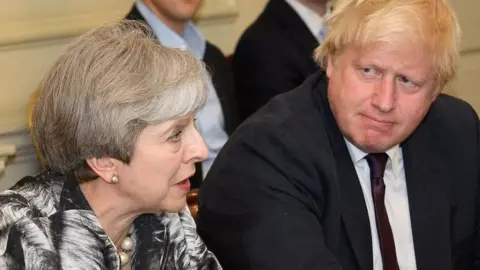What was behind Boris Johnson's Brexit article?
 PA
PAOne of Boris Johnson's colleagues once said to me, "the thing you have to understand about him, is that he wants to be loved."
A human enough observation. A little cruel perhaps, a slightly dismissive barb to explain the foreign secretary's political motivations. It does, in part, tell us what this explosion is all about.
Since the referendum, when Boris Johnson was the biggest political star in the firmament, that star has become at least a little tarnished, if not crashed back to earth. And he has become the totem for the anxiety and downright anger felt in some quarters about what has happened since.
If Remainers now revile him - as some do - the logic goes that he wanted, and indeed, needed to cheer up the Leavers he led to victory, or at the very least keep them onside. His article, and his refusal to back down in the perpetual row about the £350m (as we've said many times, it's a figure Vote Leave used misleadingly by leaving out important caveats), does then fit with his friend's view that he "wants to be loved".
However, it's not just part of the seemingly never-ending Tory psycho drama (see important policy decision, have a leadership breakdown), and to see it just through that lens is a mistake. While the good old fashioned "splits" are denied, there is a difference of opinion in cabinet over how much, for how long, and for what, we continue to pay money to the European Union.
As I wrote on Friday, the cabinet is coalescing around a plan to keep paying cash during our period of transition, and the prime minister, while she won't name any numbers, is preparing to talk about this in Italy this week. But there is nervousness and anxiety among Team Johnson about just what she is willing to commit to.
Johnson's team now insists, though, that his issue is the future relationship, not payments in transition, but "payments after transition are a different matter".
Confused? Yes, me too.
But there are differences over policy here - it is not just Boris Johnson stamping his feet because he wanted to be prime minister. His behaviour is also a protest at what seems to be the emerging political view.
If you don't feel you are being heard in government, there is often a journalist or a newspaper lurking nearby only too happy to carry your discontent, and when it is Boris Johnson, it's catnip. As we reported on Friday, May and Johnson are due to meet in the coming days, probably at the UN tomorrow. It might be handy that there'll be lots of diplomats around to help if it gets too frosty.
What's happened is also a product of structural strangeness in the government. When Theresa May made Boris Johnson the foreign secretary, she also created a new government department to deal with Brexit. While she gave him a huge job, she also kept him away from the frontline of Brexit negotiations.
The Leavers' chief cheerleader was therefore clad in the irons of government, but not able to lead the push on the area that had defined him. For a clever, ambitious, if capricious, politician, perhaps that trap was inevitably, and eventually, going to blow. In normal times (remember them?) there should be nothing weird about a foreign secretary speaking out about foreign policy.
Lastly, and probably most importantly however, the turmoil of the last few days is a reminder that despite a couple of weeks of calm, all is not well in Theresa May's government.
Since MPs returned from the break, No 10 has been extremely eager to be seen to be getting on with things, to show competence through government, basically to insulate the prime minister from criticism by cracking on.
Well, it hardly feels like smooth government now, with the foreign secretary in a verbal punch-up with one of the country's most senior civil servants, other cabinet ministers telling him to pipe down publicly, and the carefully planned build-up to a very significant political speech at the end of the week now a circus.
Voters may wonder, if Theresa May can't keep her ministers under control, can she rebuild her authority in the country - let alone come across as a convincing leader in the tricky EU talks to come?
For all of us, that's the question that really matters.
